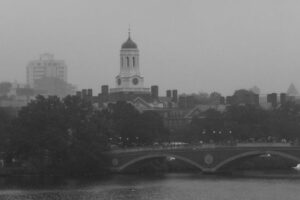Harvard Whistleblower Accuses University of Kowtowing to Mark Zuckerberg

Dr. Joan Donovan, a leading expert on social media disinformation previously employed at Harvard, has accused the university of shuttering her research to protect its relationship with Facebook founder Mark Zuckerberg. This comes from a press release and related materials Donovan’s lawyers issued this week (December 4) detailing the full extent of her charges. This included a 248-page disclosure of Donovan’s allegations her lawyers sent directly to Harvard officials and the Department of Education. Apparently, she also has reached out to the Massachusetts Attorney General.
Donovan worked for the Shorenstein Center at Harvard’s John F. Kennedy School of Government, leading its research on media manipulation on social media platforms. Many looked to Donovan’s work as groundbreaking and especially important because of the increasing sensitivity of the issues involved and the outsized influence of the tech companies implicated. But according to Donovan, Harvard shut the project down soon after Zuckerburg’s charitable arm (the Chan Zuckerburg Initiative) donated $500 million to the university for a new center on artificial intelligence. The university then eliminated her position altogether.
Donovan claims the university’s action was precipitated by her work on the so-called Facebook Papers. Donovan was involved in an effort to archive these documents and make them publicly available. As Donovan describes it, “the mood changed overnight. The work we were doing turned from a source of pride for Harvard into a source of shame. Instead of seizing on an extraordinary opportunity to further our knowledge of social media platforms and how they work hidden from public scrutiny, the university subjected my team and our projects to death by a thousand cuts.”
Harvard fiercely disputes Donovan’s charges, telling the Washington Post she was a staff employee and the school had not been able to find a faculty sponsor to oversee her work, as university policy requires. The school also denied Donovan was fired, saying she “was offered the chance to continue as a part-time adjunct lecturer, and she chose not to do so.” Kennedy School spokesperson Sofiya Cabalquinto sent a more fulsome response by email:
The document’s allegations of unfair treatment and donor interference are false. The narrative is full of inaccuracies and baseless insinuations, particularly the suggestion that Harvard Kennedy School allowed Facebook to dictate its approach to research. By policy and in practice, donors have no influence over this or other work. . . . Joan Donovan was hired as a staff member (not a faculty member) to manage a media manipulation project. When the original faculty leader of the project left Harvard, the School tried for some time to identify another faculty member who had time and interest to lead the project. After that effort did not succeed, the project was given more than a year to wind down. Joan Donovan was not fired, and most members of the research team chose to remain at the School in new roles.
But apparently not everyone at Harvard agrees with the university’s official take. Harvard Law School professor Lawrence Lessig, an expert on corruption, has spoken up on Donovan’s behalf. He told the Post the university’s faculty member requirement should be limited to traditional staff work, not research papers, other publications, and teaching: “When you’re doing what looks like academic work as one of the most prominent people in an academic field, the university ought to award that person the protections of academic freedom.”
Donovan’s lawyers were even more emphatic in describing what they see as Harvard’s mistreatment of Donovan and the threat it poses to academic integrity everywhere.
This is a shocking betrayal of Harvard’s academic integrity and the public interest. We’ve seen in the past how Big Tobacco, Big Energy and Big Pharma have succeeded in influencing, undermining, and co-opting research to protect their lies, their profits and evade accountability. Now Meta, with the complicity of a powerful ally, is following the same playbook. Whether Harvard acted at the company’s direction or took the initiative on their own to protect Meta’s interests, the outcome is the same: corporate interests are undermining research and academic freedom to the detriment of the public. If the most powerful university in the world cannot safeguard the integrity of public interest research in the face of corporate influence-buying, what hope is there for any other research institution?
Donovan is off to Boston University, where she started this semester as an assistant professor in the College of Communications. As for Harvard, it is not clear what steps, if any, the university will take in response to Donovan’s highly-charged claims. Whether the Department of Education or Massachusetts AG take any action also remains to be seen. But given Donovan’s detailed disclosures and the significant attention they have received in the press, it seems fairly certain there is more to come on this very serious subject. Stay tuned.
And if you would like more context on what it means to be a whistleblower, or have your own information relating to potential fraud or misconduct, please don’t hesitate to contact us. We will connect you with an experienced member of our whistleblower lawyer team for a free and confidential consult or to answer any questions you might have.
Read More
Tagged in: Whistleblower Evidence,